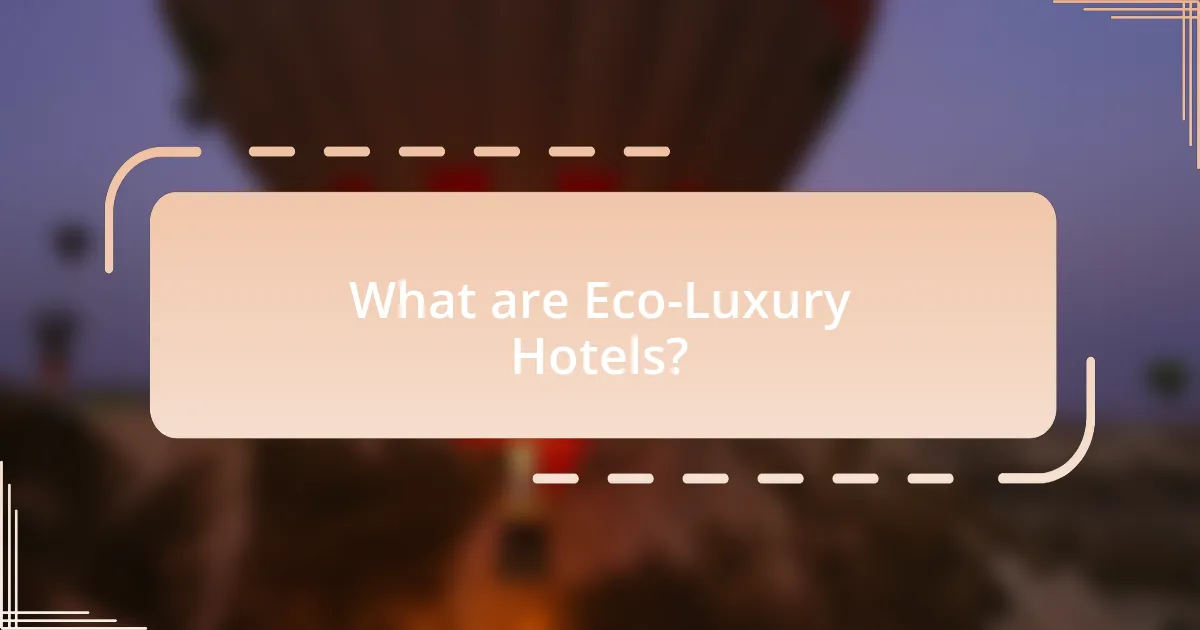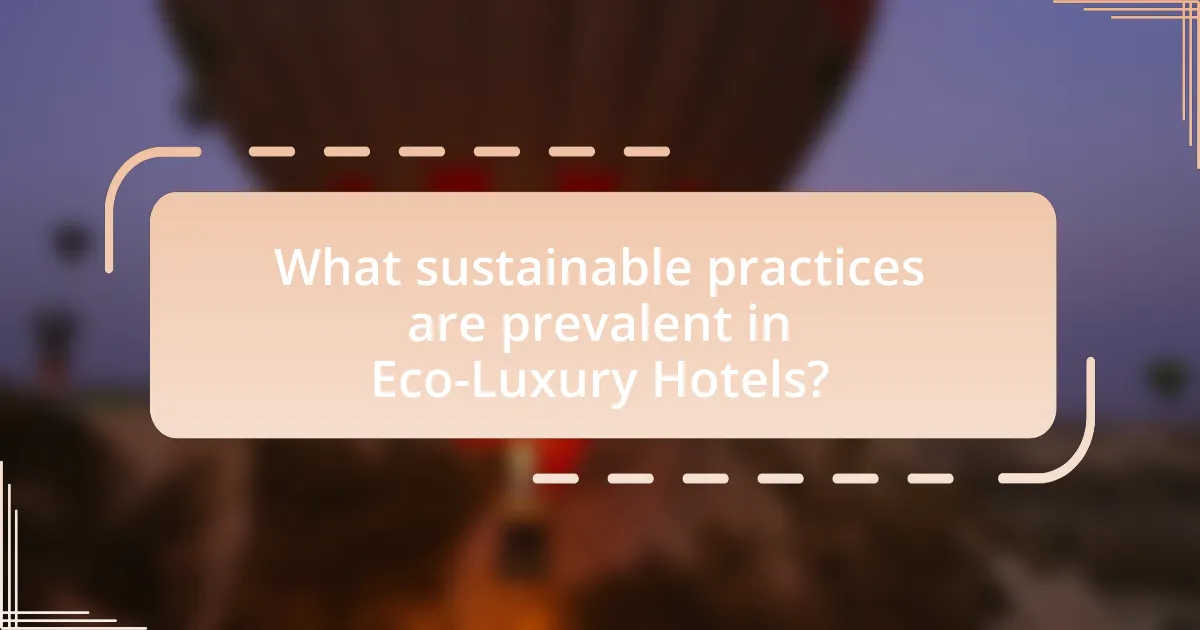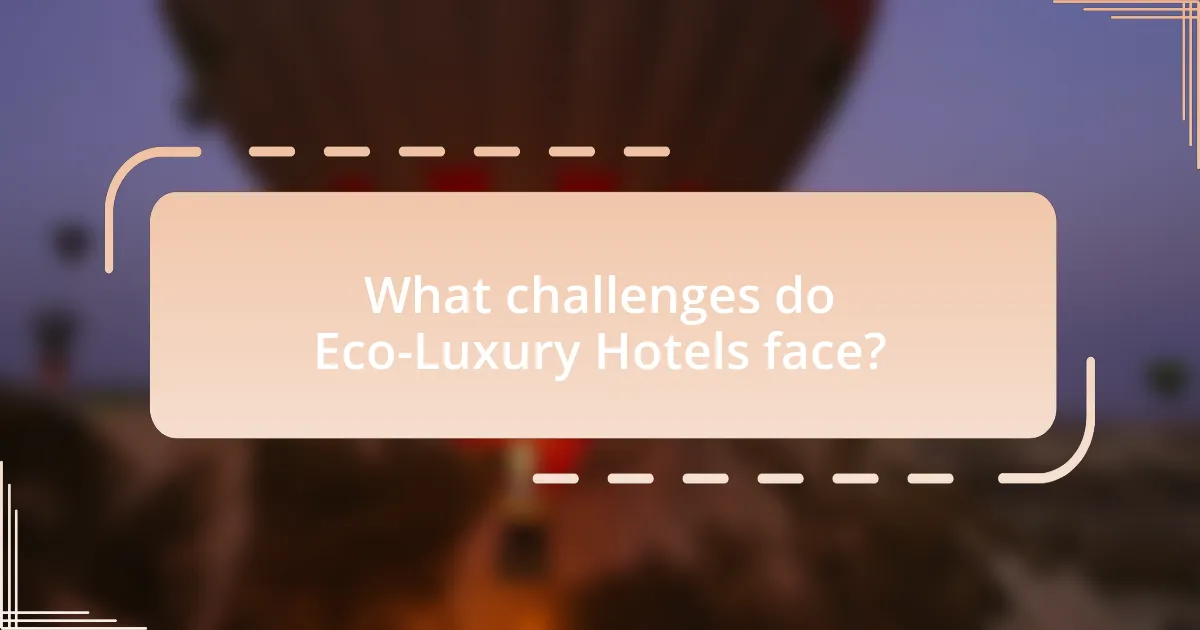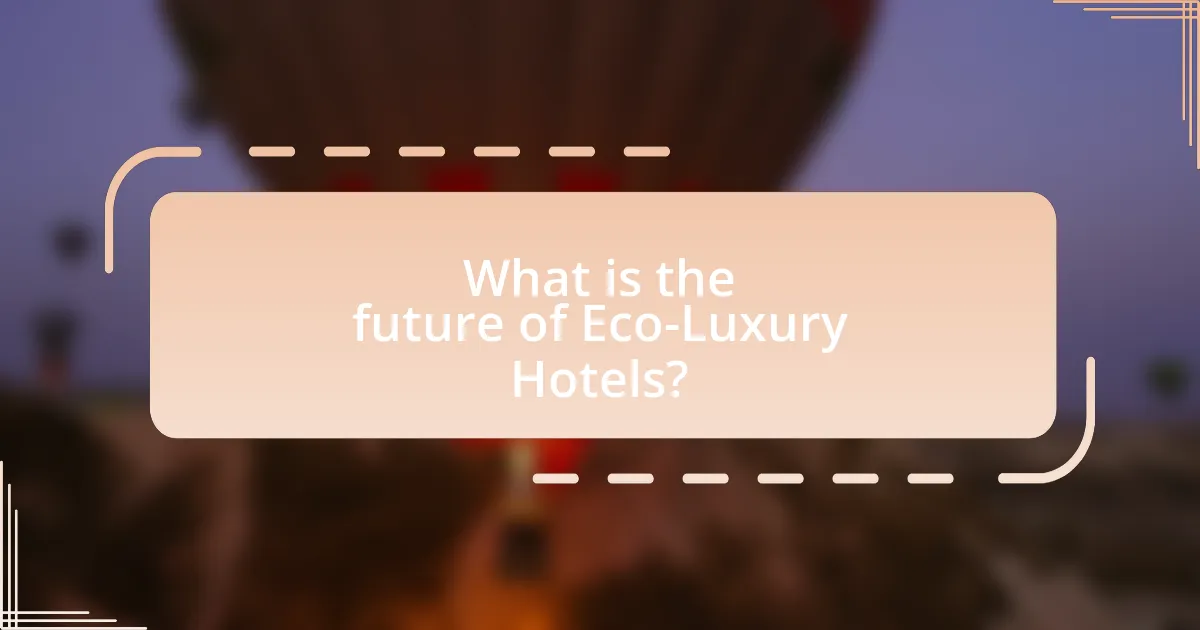Eco-luxury hotels represent a growing segment of the hospitality industry that combines high-end accommodations with a commitment to sustainability and environmental responsibility. These establishments implement various eco-friendly practices, including the use of renewable energy, local and organic food sourcing, and waste reduction strategies, often achieving certifications that validate their sustainable efforts. The article explores how eco-luxury hotels differ from traditional luxury hotels, the sustainable practices they adopt, and the challenges they face in balancing luxury with environmental stewardship. Additionally, it examines consumer preferences driving the demand for eco-luxury accommodations and the future trends shaping this sector.

What are Eco-Luxury Hotels?
Eco-luxury hotels are high-end accommodations that prioritize sustainability and environmental responsibility while providing luxurious experiences. These hotels implement eco-friendly practices such as using renewable energy sources, minimizing waste, sourcing local and organic food, and promoting conservation efforts. For instance, a report by the Global Sustainable Tourism Council highlights that eco-luxury hotels often achieve certifications for their sustainable practices, demonstrating their commitment to reducing their ecological footprint while offering premium services to guests.
How do Eco-Luxury Hotels differ from traditional luxury hotels?
Eco-luxury hotels differ from traditional luxury hotels primarily in their commitment to sustainability and environmental responsibility. While traditional luxury hotels focus on providing opulent experiences and high-end amenities, eco-luxury hotels integrate eco-friendly practices such as using renewable energy sources, sourcing local and organic food, and implementing waste reduction strategies. For example, a study by the Global Sustainable Tourism Council indicates that eco-luxury hotels often achieve LEED certification, demonstrating their adherence to rigorous environmental standards. This focus on sustainability not only enhances the guest experience but also contributes positively to the environment, setting eco-luxury hotels apart from their traditional counterparts.
What sustainable practices are commonly implemented in Eco-Luxury Hotels?
Eco-luxury hotels commonly implement sustainable practices such as energy efficiency, water conservation, and waste reduction. These hotels often utilize renewable energy sources, like solar panels, to minimize their carbon footprint. Additionally, they may incorporate water-saving fixtures and systems to reduce consumption, which can lead to significant savings; for instance, hotels that install low-flow showerheads can save up to 30% on water usage. Waste reduction strategies include composting organic waste and recycling materials, which not only decreases landfill contributions but also promotes a circular economy. Furthermore, eco-luxury hotels frequently source local and organic food to support sustainable agriculture and reduce transportation emissions.
How do Eco-Luxury Hotels maintain high-end service while being sustainable?
Eco-luxury hotels maintain high-end service while being sustainable by integrating eco-friendly practices into their luxury offerings without compromising guest experience. These hotels often utilize locally sourced, organic materials for furnishings and amenities, ensuring that guests enjoy premium quality while supporting local economies. Additionally, they implement energy-efficient technologies, such as solar panels and smart climate control systems, which reduce environmental impact while enhancing guest comfort.
For instance, a study by the Global Sustainable Tourism Council highlights that eco-luxury hotels can achieve a 30% reduction in energy consumption through such technologies, demonstrating that sustainability can coexist with luxury. Furthermore, these establishments often provide personalized services, such as bespoke dining experiences featuring organic, farm-to-table cuisine, which not only elevates the guest experience but also aligns with sustainable practices.
Why is the rise of Eco-Luxury Hotels significant?
The rise of Eco-Luxury Hotels is significant because it reflects a growing consumer demand for sustainable travel options that combine luxury with environmental responsibility. This trend is evidenced by a 2021 report from the Global Wellness Institute, which indicated that 70% of travelers are more likely to choose accommodations that prioritize sustainability. Eco-Luxury Hotels often implement practices such as energy-efficient systems, locally sourced materials, and waste reduction strategies, which not only minimize their ecological footprint but also enhance the guest experience by promoting wellness and connection to nature. This shift in the hospitality industry signals a broader societal movement towards sustainability, influencing other sectors and encouraging more businesses to adopt eco-friendly practices.
What trends are driving the demand for Eco-Luxury Hotels?
The demand for Eco-Luxury Hotels is driven by increasing consumer awareness of environmental issues, a growing preference for sustainable travel options, and the desire for unique, authentic experiences. Consumers are increasingly prioritizing eco-friendly practices, with 87% of travelers indicating a preference for sustainable accommodations, according to a 2021 Booking.com survey. Additionally, luxury travelers are seeking personalized experiences that align with their values, leading hotels to adopt sustainable practices such as using renewable energy, sourcing local materials, and implementing waste reduction strategies. This shift not only meets consumer expectations but also enhances brand loyalty and market competitiveness in the hospitality sector.
How do consumer preferences influence the growth of Eco-Luxury Hotels?
Consumer preferences significantly influence the growth of Eco-Luxury Hotels by driving demand for sustainable and environmentally friendly accommodations. As consumers increasingly prioritize sustainability, they seek hotels that align with their values, leading to a rise in eco-luxury offerings. According to a 2021 study by Booking.com, 81% of travelers expressed a desire to stay in eco-friendly accommodations, highlighting a clear market trend. This shift in consumer behavior compels hotel operators to adopt sustainable practices, such as using renewable energy, reducing waste, and sourcing local products, to attract and retain guests. Consequently, the alignment of consumer preferences with eco-conscious practices fosters the expansion of Eco-Luxury Hotels in the hospitality industry.

What sustainable practices are prevalent in Eco-Luxury Hotels?
Eco-luxury hotels commonly implement sustainable practices such as energy efficiency, water conservation, and waste reduction. These hotels often utilize renewable energy sources like solar and wind power to minimize their carbon footprint. For instance, a study by the Global Sustainable Tourism Council indicates that eco-luxury hotels can reduce energy consumption by up to 30% through energy-efficient lighting and HVAC systems. Additionally, many eco-luxury hotels employ water-saving technologies, such as low-flow fixtures and rainwater harvesting systems, which can lead to a reduction in water usage by approximately 20-50%. Waste management practices, including composting and recycling programs, are also prevalent, with some hotels achieving waste diversion rates of over 70%. These practices not only enhance the sustainability of the hotels but also appeal to environmentally conscious travelers.
How do Eco-Luxury Hotels incorporate renewable energy sources?
Eco-luxury hotels incorporate renewable energy sources primarily through the installation of solar panels, wind turbines, and geothermal systems. These hotels utilize solar panels to harness sunlight for electricity and heating, significantly reducing their reliance on fossil fuels. For instance, a study by the International Renewable Energy Agency indicates that solar energy can cover up to 70% of a hotel’s energy needs in sunny regions. Additionally, some eco-luxury hotels implement wind turbines to generate clean energy, while geothermal systems provide efficient heating and cooling by tapping into the Earth’s natural temperature. This integration of renewable energy not only minimizes carbon footprints but also enhances the overall sustainability of high-end accommodations.
What types of renewable energy are most commonly used?
The most commonly used types of renewable energy are solar, wind, hydroelectric, and biomass energy. Solar energy harnesses sunlight through photovoltaic cells, making it a leading source of renewable energy globally, with over 800 gigawatts of installed capacity as of 2021. Wind energy utilizes turbines to convert wind flow into electricity, contributing significantly to energy grids, especially in countries like Denmark, where wind accounts for about 47% of electricity consumption. Hydroelectric power generates energy by using flowing water, representing approximately 16% of global electricity production. Biomass energy, derived from organic materials, is also widely utilized, particularly in heating and electricity generation, with the U.S. producing around 5% of its energy from biomass sources.
How does the use of renewable energy impact operational costs?
The use of renewable energy significantly reduces operational costs for eco-luxury hotels. By investing in solar panels, wind turbines, or geothermal systems, these hotels can lower their energy bills, as renewable sources often have lower long-term costs compared to fossil fuels. For instance, a study by the International Renewable Energy Agency found that solar energy can reduce electricity costs by up to 80% over time. Additionally, renewable energy systems often qualify for government incentives and tax credits, further decreasing initial investment and operational expenses. This shift not only enhances profitability but also aligns with the growing consumer demand for sustainable practices in high-end accommodation.
What role does local sourcing play in Eco-Luxury Hotels?
Local sourcing plays a crucial role in Eco-Luxury Hotels by enhancing sustainability and supporting local economies. By procuring food, materials, and services from nearby suppliers, these hotels reduce their carbon footprint associated with transportation and promote the use of seasonal and organic products. For instance, a study by the Global Sustainable Tourism Council indicates that local sourcing can decrease greenhouse gas emissions by up to 30% compared to imported goods. Additionally, local sourcing fosters community relationships and ensures that the economic benefits of tourism are retained within the local area, thereby contributing to social sustainability.
How do Eco-Luxury Hotels support local economies through sourcing?
Eco-luxury hotels support local economies through sourcing by prioritizing local products and services, which stimulates regional businesses and creates jobs. By sourcing food from nearby farms, these hotels not only reduce transportation emissions but also ensure that a significant portion of their revenue circulates within the local community. For instance, a study by the Global Sustainable Tourism Council found that hotels that engage in local sourcing can increase local economic benefits by up to 30%. Additionally, eco-luxury hotels often collaborate with local artisans for decor and amenities, further enhancing local craftsmanship and providing a platform for cultural exchange. This approach not only fosters economic growth but also promotes sustainable practices that benefit the environment and the community.
What are the benefits of using locally sourced materials and food?
Using locally sourced materials and food enhances sustainability and supports local economies. This practice reduces transportation emissions, as products do not need to travel long distances, thereby lowering the carbon footprint associated with logistics. Additionally, it fosters community relationships and stimulates local agriculture, which can lead to fresher, higher-quality food options. Research indicates that local food systems can increase economic resilience; for instance, a study by the American Farmland Trust found that every dollar spent on local food generates an estimated $1.76 in local economic activity. Furthermore, utilizing local materials can contribute to unique architectural styles that reflect the region’s culture, enhancing the guest experience in eco-luxury hotels.

What challenges do Eco-Luxury Hotels face?
Eco-luxury hotels face significant challenges in balancing sustainability with profitability. These establishments often struggle with the high costs associated with implementing eco-friendly technologies and practices, such as renewable energy systems and sustainable materials, which can deter investment. Additionally, eco-luxury hotels encounter difficulties in sourcing local and sustainable products, as supply chain limitations can affect availability and pricing. Furthermore, they must navigate consumer perceptions, as some guests may prioritize luxury over sustainability, leading to potential conflicts in marketing strategies. According to a report by the Global Sustainable Tourism Council, 70% of travelers express a preference for sustainable options, yet only a fraction actively seek out eco-luxury accommodations, highlighting the challenge of aligning consumer demand with sustainable offerings.
How do Eco-Luxury Hotels balance luxury and sustainability?
Eco-luxury hotels balance luxury and sustainability by integrating high-end amenities with environmentally responsible practices. These hotels often utilize renewable energy sources, such as solar or wind power, to minimize their carbon footprint while providing guests with modern comforts. For example, many eco-luxury hotels implement water conservation systems and use eco-friendly materials in their construction and furnishings, ensuring that luxury does not come at the expense of the environment. Additionally, they often source food locally and offer organic options, enhancing the guest experience while supporting sustainable agriculture. This approach not only attracts environmentally conscious travelers but also demonstrates that luxury can coexist with sustainability.
What are the common misconceptions about Eco-Luxury Hotels?
Common misconceptions about Eco-Luxury Hotels include the belief that they are less comfortable than traditional luxury hotels and that they are prohibitively expensive. In reality, many Eco-Luxury Hotels offer high-end amenities and services comparable to their non-eco counterparts, often incorporating sustainable practices without sacrificing comfort. Additionally, while some Eco-Luxury Hotels may have higher initial costs, many provide long-term savings through energy efficiency and sustainable sourcing, making them financially viable options for travelers. According to a study by the Global Sustainable Tourism Council, eco-friendly practices can enhance guest experiences and satisfaction, debunking the myth that sustainability compromises luxury.
How can Eco-Luxury Hotels overcome sustainability-related challenges?
Eco-luxury hotels can overcome sustainability-related challenges by implementing comprehensive waste management systems and utilizing renewable energy sources. By adopting practices such as composting, recycling, and reducing single-use plastics, these hotels can significantly minimize their environmental footprint. Additionally, investing in solar panels or wind energy can reduce reliance on fossil fuels, aligning with sustainability goals. A study by the Global Sustainable Tourism Council highlights that hotels adopting such measures can reduce operational costs by up to 30%, demonstrating the financial viability of sustainable practices.
What are the financial implications of adopting sustainable practices?
Adopting sustainable practices in eco-luxury hotels can lead to significant financial benefits, including cost savings, increased revenue, and enhanced brand reputation. For instance, implementing energy-efficient systems can reduce utility costs by up to 30%, as reported by the U.S. Green Building Council. Additionally, hotels that prioritize sustainability often attract a growing segment of environmentally conscious consumers, leading to higher occupancy rates and premium pricing. A study by the Cornell University School of Hotel Administration found that guests are willing to pay up to 10% more for eco-friendly accommodations. Furthermore, sustainable practices can mitigate risks associated with regulatory compliance and potential fines, ultimately contributing to long-term financial stability.
How do initial investments in sustainability affect long-term profitability?
Initial investments in sustainability significantly enhance long-term profitability for eco-luxury hotels. By adopting sustainable practices, these hotels reduce operational costs through energy efficiency, waste reduction, and water conservation. For instance, a study by the Cornell University School of Hotel Administration found that hotels implementing energy-efficient technologies can save up to 30% on energy costs. Additionally, sustainability attracts a growing segment of environmentally conscious consumers, leading to increased occupancy rates and higher room rates. According to a report by Booking.com, 72% of travelers are more likely to choose eco-friendly accommodations, which directly correlates with increased revenue. Thus, the initial financial outlay for sustainable initiatives is often recouped through cost savings and enhanced market appeal, ultimately driving long-term profitability.
What funding options are available for Eco-Luxury Hotels?
Eco-luxury hotels can access several funding options, including green loans, government grants, and private investments. Green loans, offered by various financial institutions, provide favorable terms for projects that promote sustainability, such as energy-efficient renovations or renewable energy installations. Government grants, often available through environmental agencies, support initiatives that enhance eco-friendly practices, such as waste reduction and water conservation. Additionally, private investors increasingly seek opportunities in sustainable tourism, providing capital for eco-luxury hotel projects that align with their values. These funding avenues are crucial for the development and operation of eco-luxury hotels, enabling them to implement sustainable practices effectively.

What is the future of Eco-Luxury Hotels?
The future of eco-luxury hotels is poised for significant growth, driven by increasing consumer demand for sustainable travel options. Research indicates that 70% of travelers are more likely to book accommodations that prioritize environmental sustainability, reflecting a shift in consumer preferences towards eco-friendly practices. This trend is further supported by the global hospitality industry’s commitment to reducing carbon footprints and implementing sustainable practices, such as energy-efficient technologies and locally sourced materials. As a result, eco-luxury hotels are expected to integrate advanced sustainability measures, enhancing guest experiences while promoting environmental stewardship.
How will technology shape the evolution of Eco-Luxury Hotels?
Technology will significantly shape the evolution of Eco-Luxury Hotels by enhancing sustainability through smart systems and innovative materials. Smart technologies, such as energy-efficient lighting and automated climate control, reduce energy consumption, which is crucial for eco-friendly operations. For instance, hotels utilizing IoT devices can monitor energy usage in real-time, leading to a reported 20-30% reduction in energy costs, as evidenced by a study from the International Energy Agency. Additionally, advancements in sustainable materials, like recycled construction elements and biodegradable amenities, will further minimize environmental impact while maintaining luxury standards. This integration of technology not only supports eco-friendly practices but also meets the growing consumer demand for sustainable luxury experiences.
What innovative technologies are being adopted in Eco-Luxury Hotels?
Eco-luxury hotels are adopting innovative technologies such as energy-efficient systems, smart room controls, and sustainable building materials. Energy-efficient systems, including solar panels and geothermal heating, significantly reduce carbon footprints and operational costs. Smart room controls allow guests to manage lighting, temperature, and energy usage through mobile apps, enhancing comfort while promoting sustainability. Additionally, the use of sustainable building materials, such as reclaimed wood and recycled metals, minimizes environmental impact during construction and renovation. These technologies not only improve guest experiences but also align with the growing demand for environmentally responsible practices in the hospitality industry.
How can technology enhance guest experiences while promoting sustainability?
Technology can enhance guest experiences while promoting sustainability by integrating smart systems that optimize energy use and reduce waste. For instance, smart thermostats and lighting systems adjust automatically based on occupancy, leading to energy savings of up to 30% in hotels. Additionally, mobile apps allow guests to control room settings, access eco-friendly services, and receive real-time information about sustainable practices, such as local recycling programs or carbon offset options. These technological advancements not only improve guest comfort and convenience but also align with the growing demand for environmentally responsible travel, as evidenced by a 2022 study showing that 70% of travelers prefer accommodations with sustainable practices.
What can travelers expect from Eco-Luxury Hotels in the coming years?
Travelers can expect Eco-Luxury Hotels to increasingly prioritize sustainability through innovative practices and technologies in the coming years. These hotels will likely implement advanced energy-efficient systems, such as solar panels and smart climate control, to reduce their carbon footprint. Additionally, the use of locally sourced materials and organic products in construction and amenities will become more common, aligning with the growing consumer demand for environmentally responsible options. A report by the Global Sustainable Tourism Council indicates that 70% of travelers are willing to pay more for sustainable accommodations, reinforcing the trend towards eco-friendly luxury experiences.
How will Eco-Luxury Hotels adapt to changing consumer expectations?
Eco-Luxury Hotels will adapt to changing consumer expectations by integrating advanced sustainable practices and enhancing personalized guest experiences. These hotels are increasingly investing in renewable energy sources, such as solar and wind, to reduce their carbon footprint, which aligns with the growing consumer demand for environmentally responsible travel options. For instance, a report by the Global Sustainable Tourism Council indicates that 70% of travelers are more likely to choose accommodations that demonstrate sustainability efforts. Additionally, Eco-Luxury Hotels are implementing waste reduction strategies, such as composting and recycling programs, to meet the expectations of eco-conscious guests. By offering locally sourced organic food and eco-friendly amenities, these hotels not only cater to consumer preferences but also promote local economies and biodiversity.
What trends should travelers look for in Eco-Luxury accommodations?
Travelers should look for trends in Eco-Luxury accommodations that emphasize sustainability, local sourcing, and innovative design. These accommodations increasingly incorporate renewable energy sources, such as solar panels and wind turbines, to minimize their carbon footprint. Additionally, many eco-luxury hotels are focusing on locally sourced materials and organic food options, which support local economies and reduce transportation emissions. Furthermore, the integration of biophilic design, which connects guests with nature through natural light and green spaces, is becoming more prevalent. According to a report by the Global Sustainable Tourism Council, 70% of travelers are willing to pay more for sustainable options, highlighting the growing demand for eco-friendly practices in high-end accommodations.
What are some best practices for choosing an Eco-Luxury Hotel?
To choose an Eco-Luxury Hotel effectively, prioritize properties that have verified sustainability certifications, such as LEED or Green Key. These certifications indicate that the hotel adheres to rigorous environmental standards, including energy efficiency, water conservation, and waste reduction. Additionally, research the hotel’s sourcing practices for food and amenities; hotels that support local and organic suppliers contribute positively to the local economy and reduce carbon footprints. Furthermore, evaluate the hotel’s commitment to community engagement and conservation efforts, as these initiatives reflect a genuine dedication to sustainability. Lastly, read guest reviews focusing on sustainability practices to gain insights into the hotel’s actual performance in eco-friendly initiatives.
How can travelers identify truly sustainable practices in hotels?
Travelers can identify truly sustainable practices in hotels by looking for certifications from recognized environmental organizations, such as LEED (Leadership in Energy and Environmental Design) or Green Key. These certifications indicate that the hotel adheres to strict sustainability standards, including energy efficiency, water conservation, and waste reduction. Additionally, travelers should examine the hotel’s policies on sourcing local and organic food, using eco-friendly cleaning products, and implementing recycling programs. Research shows that hotels with these practices not only reduce their environmental impact but also enhance guest experiences, as highlighted in a study by the Cornell University School of Hotel Administration, which found that sustainability initiatives can lead to increased customer satisfaction and loyalty.
What questions should travelers ask when booking an Eco-Luxury Hotel?
Travelers should ask about the hotel’s sustainability certifications, such as LEED or Green Key, to ensure it meets recognized environmental standards. Additionally, inquiries should include the hotel’s waste management practices, energy sources, and water conservation efforts. Understanding the sourcing of food and materials, including whether they prioritize local and organic options, is also crucial. Lastly, travelers should ask about community engagement initiatives to assess the hotel’s commitment to supporting local economies and cultures. These questions help verify the hotel’s eco-friendly claims and ensure a genuine commitment to sustainability.